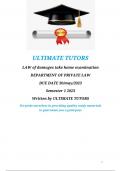Exam (elaborations)
LAW OF DAMAGES (LPL4802) take home examination 30 MAY 2023 (bibliography included)
- Institution
- University Of South Africa (Unisa)
- Book
- Law of Damages
The document provides fully answered questions and includes a bibliography it has less efforts of altering to your specifications required. QUESTION 1: NATURE AND ASSESSMENT OF NON-PATRIMONIAL LOSS (ESSAY) Study the case, Residents of Industry House and Others v Minister of Police and Othe...
[Show more]



